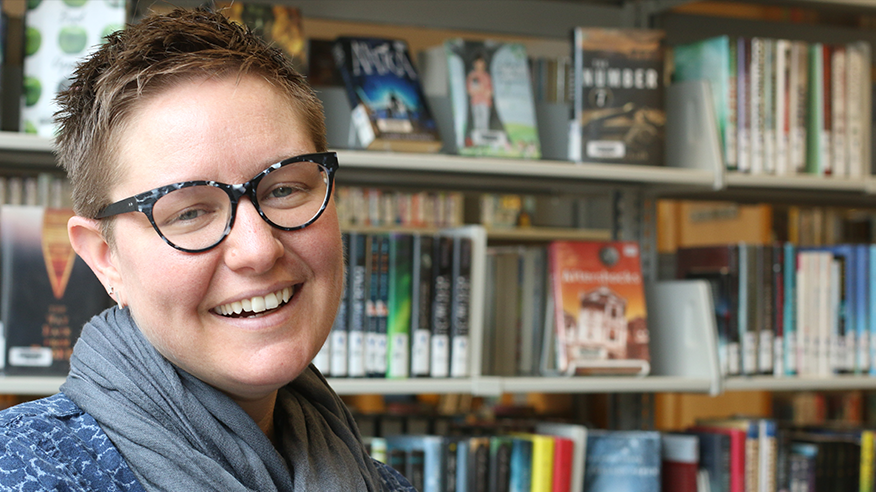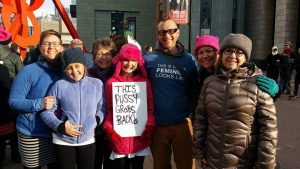
“To some degree, I always gravitated towards the social justice element and freedom of information element of the library. Did I realize that I would be working in an urban center and really deal with what’s happening in the middle of the city that’s in the middle of an opioid epidemic? No way.”
Rachel Fewell ’00 first became intrigued with the idea of being a professional librarian while working as a program assistant at an eldercare facility in Madison, Wis. After pursuing and completing her master’s in library information studies at UW-Madison, she started looking for jobs in Colorado – Weld County was building a number of new library branches, and both she and her husband had family in neighboring Fort Collins.
Over the next few years, she tried out a number of different positions, including supervising a children’s department, managing a small community library branch, and working as a collection manager, among others. By that point, she and her family were living in Denver and a collection management position with the Denver Public Library opened up. She made the move, staying in the role for the next five years.
Wanting to get back to the public-facing side of the library profession, she applied for the newly created role of Central Library Administrator for the Denver Public Library in 2016. Being the first-ever in the position, there has been some fluidity as far as what the role fully entails. She is in charge of the 540,000 square foot building and supervises five public-facing departments: circulating collection and circulation services, the community technology center, and the departments of social work, reference, and western history and genealogy.
 She says that the biggest role for the central library is providing a free and accessible place for everyone. “I like to say that libraries are the last truly democratic institution – anyone is allowed to come into the library, anytime, no matter what.” Fewell is a huge advocate for free and equal access, and works diligently to keep those values in place so that anyone who wants to come into the building may come in freely.
She says that the biggest role for the central library is providing a free and accessible place for everyone. “I like to say that libraries are the last truly democratic institution – anyone is allowed to come into the library, anytime, no matter what.” Fewell is a huge advocate for free and equal access, and works diligently to keep those values in place so that anyone who wants to come into the building may come in freely.
The library serves people from all walks of life, from people who are looking for resources to start a small business, to small children coming in with their families for story time, to people experiencing homelessness, addiction, or mental health issues. Fewell says they really try to cover all the bases and be the space that everyone is welcome.
However, in serving so many different people comes managing many different perceptions and expectations in terms of what the library is and who it’s a space for. People who didn’t grow up in an urban setting may expect the library to be a quiet and calm place, and might never have experienced a library setting where people going through life challenges are also present. “It’s balancing those expectations,” Fewell says, “and saying ‘yes, parents with small children are more than welcome and will be safe in our library,’ to saying, ‘yes, you may have a checkered past and may be in a rough spot in your life with your housing situation or addiction issue – and you’re also welcome.’”
Another challenge of being in charge of a massive public space in the middle of an urban center is dealing with the likelihood of activities going on outside the library also going on inside.
In summer 2017, a local news station did an investigative report that discovered people were using and selling drugs in and around the library. In response, the library banded together with the mayor and other city agencies to confront the issue head-on – with the library’s security and social work teams playing a crucial role.
“They’ve done an amazing job of training staff on how to work with customers who are experiencing life challenges and balancing that with everyone’s safety in the library,” Fewell says.
Because of everyone’s collective efforts, she says that the library’s calls to the Denver Police Department are down and the library is able to handle a lot more incidents on their own. They’ve worked to rearrange the library to provide better sight lines and make the library feel safer. The police department is doing regular patrols through the library, which she admits has mixed reactions, but overall has been good. The library also now has access to NARCAN as an overdose reversal – and they have save 13 lives as a result.
“It’s not solved,” Fewell says, “but we have a better plan for how staff reacts to things, how our city agencies react to things.” The Colorado state legislature has also moved forward with a pilot to do a supervised injection site facility in Denver, so she feels that the work they’ve done has helped get the message on the radar for larger systemic change. “It started out that ‘this is a library problem,’” she says, “but has grown into a stronger awareness that this is a city problem, a state problem, a country problem.”
When asked whether she was aware of the scope of work the library profession entailed when her interest was first sparked, Fewell says, “To some degree, I always gravitated towards the social justice element and freedom of information element of the library. Did I realize that I would be working in an urban center and really deal with what’s happening in the middle of a city in an opioid epidemic? No way. But I’m really happy that I am where I am. I work with amazing people who are doing good in the community.”

